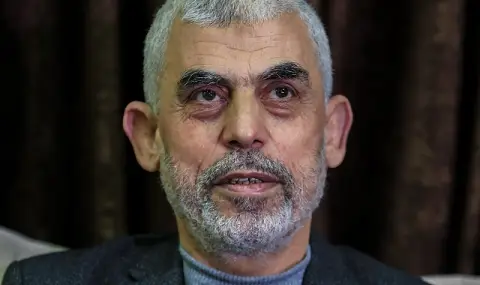The appointment of Yahya Sinwar as head of the Palestinian armed group "Hamas" formalized the role he assumed in the early hours of October 7, 2023, when the surprise attack in Israel he helped orchestrate began the bloodiest chapter of the Israeli-Palestinian conflict.
He is considered a hardliner with closer ties to the military wing of "Hamas" from his predecessor Ismail Haniyeh, who was killed in an explosion in Tehran last month that Israel blamed and which could have sparked an all-out regional war.
Sinowar has until now been considered the man who has the final say on any ceasefire agreement in the Gaza Strip and in connection with the release of the dozens of Israeli hostages still held by "Hamas". However, he is hiding somewhere in the Gaza Strip and, according to the intermediaries, it takes several days to exchange messages with him. That raises questions about how he will manage the growing organization, which has staff across the Middle East region.
"Hamas" has survived the assassinations of several high-ranking leaders of the group over the last more than three decades while managing to maintain a high degree of internal cohesion - and the inclusion of Sinuar, who tops Israel's most wanted list, was a display of intransigence. "Hamas" however, it has never faced a crisis of this magnitude - and the man who caused it is now tasked with managing the aftermath.
An even tougher stance on Israel
Hania was a veteran of the political wing of Hamas, who once served as Palestinian prime minister and in recent years ran the group's affairs from his office in Qatar. While the group has always supported armed struggle, Haniya and other exiled leaders have sometimes taken a more moderate tone, even expressing readiness for a possible two-state solution, although they still officially refuse to recognize Israel.
Sinowar, on the other hand, has spent more than two decades in Israeli prisons and has told interrogators that he killed 12 alleged Palestinian collaborators, earning him a reputation as a brutal man on both sides of the conflict.
>
Along with Mohammed Deif, the head of the military wing of Hamas, who prefers to stay in the shadows and whom Israel says was killed in a recent strike in July, he has spent years building up the military power of the group and is believed to have masterminded the October 7 attack, in which the militants carried out a cross-border attack and invaded Israel, killing 1,200 people and taking about 250 hostage.
During the latest round of talks, "Hania played an important role in trying to convince Sinouar to accept the ceasefire proposal with Israel," said Hugh Lovatt, an expert on the Israeli-Palestinian conflict at the European Foreign Policy Council (ECP ).
Sinowar has not backed down from demands for the release of hundreds of Palestinian prisoners, a full withdrawal of Israeli forces from Gaza and a permanent ceasefire - even as local officials say the ongoing war has killed nearly 40,000 Palestinians and turned much of the territory in ruins.
Israeli Prime Minister Benjamin Netanyahu promised to continue the war until the complete destruction of "Hamas" and the return of all hostages home.
"The assassination of Haniya has already brought the negotiations back to square one," said Lina Khatib, an expert on the conflict at London-based think tank Chatham House. (Chatham House). "This next chess move by "Hamas" makes the negotiations even more complicated," she added.
Sadeq Abu Amer, head of the Turkey-based Palestinian Dialogue Group think tank, said that while Sinwar's elevation appeared to be a "challenge to Israel," a deal was still possible. He added that in his new role Sinuar "could take a step that will surprise everyone".
Shadow Leader
It is difficult to predict how Sinwar will lead "Hamas" because of the mystery surrounding it.
Sinoir has not been seen since the beginning of the war, and even before October 7 he rarely appeared in public. He is probably hiding deep in the tunnel network of "Hamas" and is largely cut off from the outside world.
While he is expected to set overall policy and make the final decision on any ceasefire agreement, the day-to-day operations of "Hamas" in the Israeli-occupied West Bank and elsewhere are likely to be run by the organization's leaders in exile in Qatar, Lebanon, Turkey and Iran.
"There are issues that he can decide on, and there are also issues and problems that can be resolved by his deputies and the other members of the politburo," said Hani am Masri, a veteran Palestinian analyst who over the years he has met with most of the leaders of "Hamas", including Haniya and Sinuar.
"Hamas" has long shown resilience after the assassination of its top leaders - including founder and spiritual leader Sheikh Ahmed Yassin, who was killed in an airstrike in 2004 - but has never faced a targeted killing campaign on this scale.
Israel claims to have killed dozens of commanders of "Hamas" in Gaza, including Mohammed Deif, whose death "Hamas" neither confirms nor denies. Another senior leader of "Hamas" - Saleh al-Aruri - was killed in an Israeli airstrike in Beirut in January. The series of targeted killings likely prompted other leaders of "Hamas" to limit their movement and contacts.
This could eventually lead to the collapse of the organization, although it enjoys the support of a large number, but not the majority, of Palestinians.
"Israel's elimination of high-ranking Hamas leaders who cannot be easily replaced likely had a qualitative impact on the movement,'' says Lovat. "More importantly, however, the killing of high-ranking figures like Aruri and Haniya seems to have steered the movement in a more hardline direction," he added.
Translation from English: Simeon Tomov, BTA
